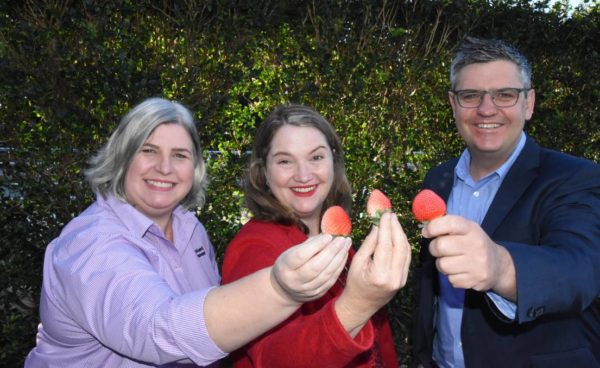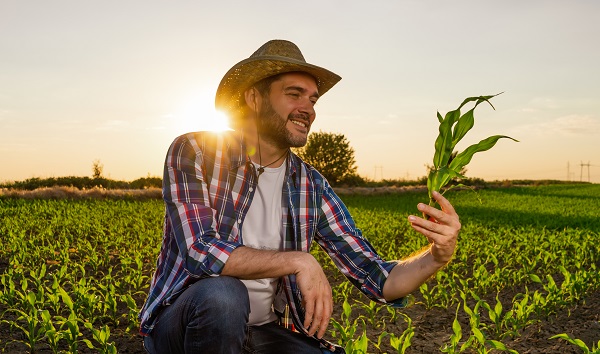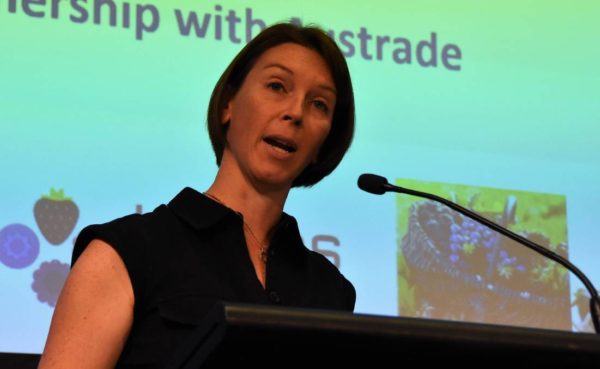If strawberries that taste and smell similar to pina colada sound appealing, the good news is they are one step closer to being stocked on supermarket shelves.
Two new “novelty” varieties of strawberry have been developed at a research station on Queensland’s Sunshine Coast. The “white” strawberries are a brilliant white inside with a pale pink blush skin, specked with red seeds, while the “pink” strawberries have a peachy pink exterior and white flesh.
Both have an intense aroma.
Lead strawberry breeder at the Department of Agriculture and Fisheries (DAF) research station Jodi Neal said her team had spent eight years perfecting the fruit, with the varieties now ready for commercialisation. “Both taste and smell really different, really beautiful,” she said. “They’re really sweet, they have very low acidity, very low tang, so it’s just this lovely, almost pina colada-style experience.”
Dr Neal said the strawberries were crossbred from a white species growing wild in Chile, to give consumers more choice.”They have a lot of the flavour notes that come from their Chilean strawberry grandparents, lovely tropical overtones, almost pineapple flavours and smells,” she said.
She said it would also help to raise awareness that unlike apples and bananas, strawberry varieties were not labelled. “We wanted to create something that consumers could visually see and go, that’s a different strawberry that we know has this different flavour and that’s what I want to put on my pavlova, or in my salad, or on my breakfast,” Dr Neal said. “In the last 10 years alone we’ve developed 16 red strawberry varieties, but unfortunately because they’re not sold under their names in the supermarkets, consumers don’t know what they’re getting.”
Last year, 45 per cent of the strawberries planted in Australia were varieties developed by Dr Neal’s team.
After eight years of development, they are ready to be commercialised Breeders want to give consumers more choice. The work partners with the grower-owned research and development corporation Hort Innovation, using grower levies and federal and Queensland government funding.
Hort Innovation chief executive Brett Fifield said the strawberries were a unique product.
“Pink and white strawberries are like nothing else on Aussie retail shelves. They’re exceptional, and so they should be,” he said. “They are the culmination of years of research, field trials, consumer preference testing and industry engagement.”
The announcement that Hort Innovation and DAF were seeking a business partner to commercialise the pink and white varieties was made at BerryQuest International 2022 on the Gold Coast, in front of industry leaders from around the globe.
Berries Australia executive director Rachel Mackenzie said the breeding program was a true success story and the way of the future to increase domestic and export demand for Australian strawberries.
Favoured fruit.
Strawberries are Australia’s third most popular fruit, with the crop valued at $417.2 million in 2021. Of the 77,751 tonnes of strawberries produced, 88 per cent were sold fresh, 7 per cent processed (mainly into preserves),
and 5 per cent were exported. “We have 42 per cent of strawberries grown in Queensland, 36 per cent grown in Victoria, 11 per cent in Western Australia,
and 7 per cent in South Australia with smaller volumes in Tasmania and New South Wales,” Ms Mackenzie said.
There are two distinct growing seasons. In summer, cooler states such as Victoria and Tasmania dominate production, while in winter most strawberries come from Queensland and Western Australia.
“That’s an exciting thing, because that’s actually a new phenomenon. Thirty or 40 years ago, you could really only get strawberries in summer and now we are lucky to be able
to get them all year round,” Ms Mackenzie said.
As for a trademark name for the pina colada style strawberries, that will be up to the commercialisation partner.
“These two varieties do have names at the moment, but they are just basically weird codes. They’re very unsexy,” Dr Neal laughed. “They’ll be marketed as, hopefully, something slightly better than SB17-230, for example.”






